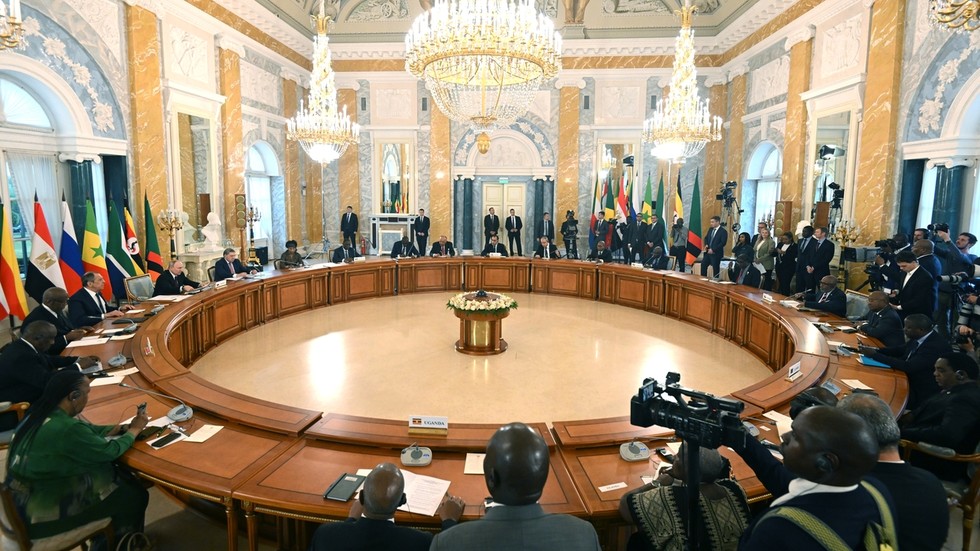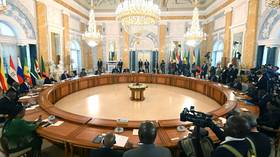
A large delegation of African leaders traveled to Moscow to promote its peace plan for Ukraine

Russian President Vladimir Putin meets African leaders in St. Petersburg, Russia. © Sputnik / Pavel Bednyakov
Russian President Vladimir Putin hosted a large delegation of African leaders in St. Petersburg on Saturday. The group traveled to Russia a day after visiting Ukraine and meeting the country’s President Vladimir Zelensky, promoting its 10-point peace roadmap designed to end the ongoing conflict between Kiev and Moscow, which has been dragging on for over a year already.
The African delegation included South African President Cyril Ramaphosa, the President of Senegal, Macky Sall, Comoros President Othman Ghazali, and the President of Zambia, Hakainde Hichilema, as well as Egyptian PM Mostafa Madbouly and senior officials from the Republic of Congo and Uganda.
Ukraine conflict affects Africa
The ongoing hostilities between Russia and Ukraine have been heavily affecting not only the “two Slavic nations” involved but the whole African continent, Ghazali stated during the talks. The conflict has invoked unprecedented threats to food and energy security for Africa, he added, urging Putin to negotiate with Kiev.
African leaders unveil peace roadmap
The delegation presented Putin with a 10-point peace roadmap, which rather broadly outlines the steps needed to end the hostilities between Moscow and Kiev. The document affirms African leaders welcome other peace initiatives from third parties and states the conflict “cannot go on forever,” with all the differences to be settled through negotiations.
The roadmap says African nations respect the sovereignty of both Russia and Ukraine in the UN Charter sense, urging the two countries to “de-escalate.” Apart from that, the document urges all the restrictions on trade in grain and other goods to be lifted, while those affected by the conflict should be given humanitarian relief. The roadmap also urges the two parties to release all the prisoners of war, while temporarily displaced persons, including children, must be returned to their homes.
Putin reveals flopped Istanbul agreemen
During the meeting, the Russian president reiterated that Moscow has never refused to negotiate, pointing out that the dialogue was jeopardized by Kiev and its backers. Putin also produced a copy of a preliminary agreement with Ukraine, initialed during talks in Istanbul last year.
“Here it is! It exists! That’s what it’s called – an agreement on permanent neutrality and security guarantees for Ukraine. It’s precisely about guarantees,” Putin stated, showing the document to the African leaders.
Ukraine broke the preliminary deal immediately after Russia withdrew its troops from Kiev, as had been agreed upon in Istanbul, Putin explained. “Kiev authorities, like their masters usually do, threw it all away to the graveyard of history,” he added, stating that no one could guarantee that Ukraine would do the same to any new deals in the future.
Roots of food crisis lie elsewhere
The Russian president also said the ongoing energy and food crises were not prompted by the conflict with Ukraine, but stemmed from the actions of the collective West.
“It was caused by the fact that Western countries began to engage in economically unjustified emissions to solve their problems related to the coronavirus pandemic,” he said.
Putin also touched upon the UN-facilitated grain deal, explaining it was agreed upon and maintained by Russia precisely to alleviate food supply issues for the less secure nations. Still, the deal did not work exactly as designed, with the food flowing out of Ukraine not to Africa but to the West instead.
“As of June 15, 31.7 million tons of agricultural produce were exported from Ukrainian ports. 976 thousand tons — %3.1 — were sent to the African countries in the most need,” Putin noted.




